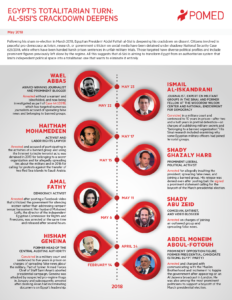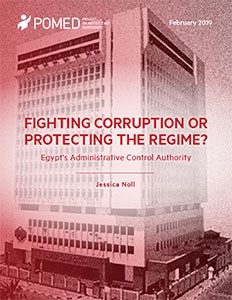 Proposed amendments to Egypt’s constitution, including granting the armed forces authority to intervene in government, would undermine judicial independence and expand executive powers that are already being abused, Human Rights Watch said today:
Proposed amendments to Egypt’s constitution, including granting the armed forces authority to intervene in government, would undermine judicial independence and expand executive powers that are already being abused, Human Rights Watch said today:
The amendments, introduced in Egypt’s parliament on February 3, 2019, would make the military “responsible for protecting the constitution and democracy … and the civil state,” effectively granting the army governing authority. A parliamentary committee quickly agreed to discuss the proposed amendments, only three days after they were proposed. Egypt’s parliament is dominated by supporters of President Abdel Fattah al-Sisi, with almost no opposition. ….
Article 140 of the proposed revised constitution would extend presidential terms from four years to six. The draft clause would also add a “transitional article” that would allow the current president, after finishing his term, to run for two more terms. If the amendments are approved, al-Sisi, whose second term will end in 2022, could stay in power until 2034. ….
In addition, the amendments could further undermine judicial independence by giving President al-Sisi tighter control over appointing senior judges and largely remove the State Council judges’ authority to revise legislation before it becomes law. The amendments could also grant wider jurisdiction for military courts to try civilians. In the last three years, over 15,000 civilians, including children, have been referred for military prosecution.
“These amendments reinforce efforts of President al-Sisi’s military-backed government to stifle people’s ability to challenge those in power,” said Michael Page, deputy Middle East and North Africa director at Human Rights Watch. “If the amendments are passed, there is a clear risk that they will formally give the armed forces unchecked authority.”
 Popular anger over graft, cronyism, and nepotism in the regime of Hosni Mubarak helped to fuel Egypt’s 2011 uprising, and corruption remains a serious problem in Egypt today, says a new report from the Project on Middle East Democracy. President Abdel Fattah al-Sisi, a strongman from the military, has declared that a “comprehensive” effort to eliminate government corruption is one of his priorities. In reality, al-Sisi’s so-called anti-corruption policies have been extremely narrow and motivated by darker concerns.
Popular anger over graft, cronyism, and nepotism in the regime of Hosni Mubarak helped to fuel Egypt’s 2011 uprising, and corruption remains a serious problem in Egypt today, says a new report from the Project on Middle East Democracy. President Abdel Fattah al-Sisi, a strongman from the military, has declared that a “comprehensive” effort to eliminate government corruption is one of his priorities. In reality, al-Sisi’s so-called anti-corruption policies have been extremely narrow and motivated by darker concerns.
To “fight corruption” al-Sisi mainly has relied upon a powerful state agency that reports directly to him, the Administrative Control Authority (ACA). The ACA’s main official role is to gather information on administrative and financial violations in the state apparatus and to refer cases to prosecutors when wrongdoing is suspected, notes Fighting Corruption or Protecting the Regime? Egypt’s Administration Control Authority, a report from Jessica Noll:
This report explains the role of the ACA as an instrument of power in al-Sisi’s regime, part of a wider system of repression and control. The report discusses how authoritarian rulers use corruption and anti-corruption campaigns to maintain their grip on power. It describes the ACA’s mandate and authorities, tracing its evolution from its origins under President Gamal Abdel Nasser through President Mohamed Morsi, whom al-Sisi overthrew in 2013. The report then considers the main functions of the ACA under al-Sisi: targeting certain officials for corruption while leaving others untouched, attracting foreign investment needed to deliver the economic turnaround he has promised, and consolidating his power over the state bureaucracy. It also discusses international assistance to the agency.
Read the full report from POMED, a partner of the National Endowment for Democracy, here.







